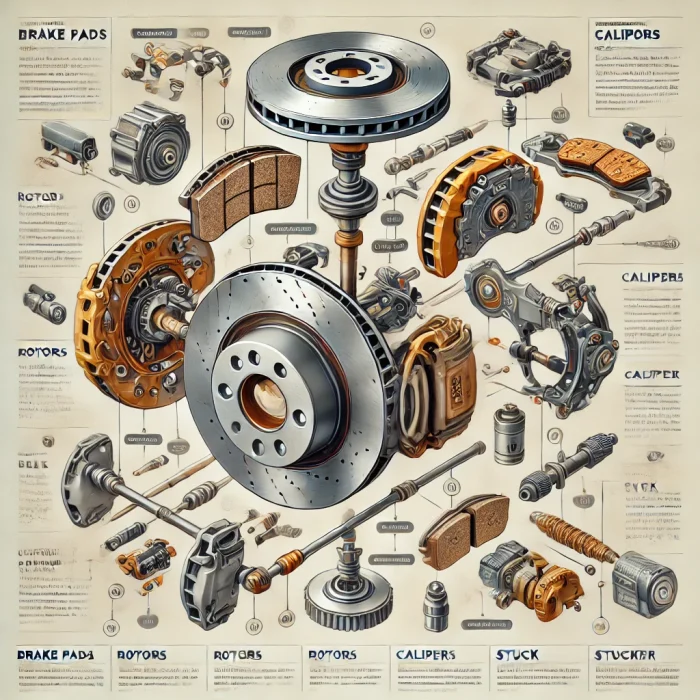Brake noise is a common issue for car owners, and it can range from being mildly annoying to an indication of serious mechanical problems. Whether it’s a minor squeak or a loud grinding noise, understanding its causes and solutions is crucial for maintaining the safety and performance of your vehicle. This expanded guide delves deeper into the reasons behind brake noise, what they signify, and the steps you can take to address them effectively.
What is Brake Noise?
Brake noise occurs when components of the braking system vibrate while the brakes are in use. These vibrations produce sounds such as squealing, squeaking, or grinding. Some noises are considered normal, especially under specific conditions like wet weather, but others may indicate underlying issues that need immediate attention.
To understand the causes, it’s helpful to review how the braking system functions. When you press the brake pedal, hydraulic pressure forces the caliper to push the brake pads against the rotor (a disc attached to the wheel). This friction slows or stops the vehicle. The components involved operate within very tight tolerances—usually with gaps of less than 1mm—so even minor irregularities can lead to noticeable noise.

1. Worn Brake Parts
The most common cause of brake noise is wear and tear on the braking components, particularly the pads and rotors.
Worn Brake Pads
Brake pads consist of a friction material bonded to a metal backing plate. Over time, the friction material wears away, leaving the metal backing plate exposed. If this happens, the metal-on-metal contact with the rotor creates a loud grinding noise. To prevent this, many modern brake pads include a wear indicator—a small metal piece designed to produce a squeaking sound when the pads are nearing the end of their lifespan. This serves as a warning to replace the pads before they wear out completely.
Worn Rotors
Rotors, which are responsible for providing the surface against which the pads create friction, also wear down over time. They can develop grooves, warping, or rust, all of which contribute to scraping or grinding noises. Regularly measuring the rotor’s thickness using a digital caliper can help determine whether it’s time for replacement. Driving on severely worn rotors not only causes noise but can also compromise braking performance and safety.
2. Dirt and Contamination
Foreign materials like dirt, rust, or oil can contaminate the braking system, leading to noise and reduced effectiveness.
Dirt and Debris
Driving through dusty, sandy, or muddy environments increases the likelihood of dirt and debris getting lodged between the brake pads and rotors. This can result in abrasive sounds and even damage to the rotor surface. Regular cleaning of the brakes can minimize these issues and help maintain smooth operation.
Rust Formation
Rust can form on brake components when they are exposed to moisture for extended periods, especially if the vehicle isn’t driven frequently. While light surface rust typically wears off during normal driving, heavy rust buildup can cause significant noise and even damage the components. To address minor rust, use sandpaper or a wire brush to clean the affected areas. For severe rust, replacement of the affected parts is often necessary.
Oil and Residue Contamination
New brake rotors are often coated with a thin layer of oil to prevent rust during storage and shipping. If this coating isn’t properly cleaned before installation, it can lead to squealing noises or reduced braking performance. Using a quality brake cleaner or soapy water to clean the rotors thoroughly before installation ensures optimal performance and noise-free operation.
3. Problems with Caliper Hardware
The caliper hardware plays a vital role in the smooth operation of the brake pads. Issues with this hardware can cause uneven braking, increased friction, or unusual noises.
- Sticking Brake Pads: If the caliper hardware is worn or corroded, it may cause the brake pads to stick in place, leading to continuous friction and noise.
- Loose or Misaligned Components: Faulty hardware can cause parts to shift or vibrate, creating clicking or rattling sounds.
Regular inspection and timely replacement of worn or damaged caliper hardware can prevent these problems and ensure consistent braking performance.
4. Issues with Drum Brakes
While many modern vehicles use disc brakes on all wheels, some still have drum brakes, particularly on the rear axle. Drum brakes use springs to pull the brake shoes back into place after braking. If these springs become worn or lose tension, the brake shoes may not fully retract, causing noise and reduced braking efficiency. Inspecting and replacing worn springs and other drum brake components as needed can resolve these issues.
5. Poor Quality or Improper Installation
The quality of brake components and the accuracy of their installation significantly affect the likelihood of brake noise.
Low-Quality Pads and Rotors
Cheap or substandard brake pads often wear out quickly, generate excessive dust, or fail to perform adequately under high temperatures. Similarly, low-quality rotors may warp or degrade faster than premium options. Investing in high-quality parts that meet or exceed your vehicle’s specifications is essential for reliable and noise-free braking.
Improper Installation
Incorrect installation of brake components, such as misaligned pads or improperly torqued calipers, can lead to noise and uneven wear. Always follow the manufacturer’s installation guidelines or entrust the task to a professional mechanic to avoid these pitfalls.
6. Environmental and Driving Conditions
Certain environmental factors and driving habits can also contribute to brake noise. For example:
- Cold Weather: Brakes may produce squeaking sounds when cold but operate quietly once warmed up.
- Wet Conditions: Water can temporarily cause squealing as it interacts with the braking surfaces.
- Aggressive Driving: Frequent hard braking generates excessive heat, leading to glazing on the pads and rotors, causing noise.
How to Prevent Brake Noise
Taking proactive steps can significantly reduce the occurrence of brake noise:
- Regular Maintenance: Schedule routine inspections of your braking system to identify and address issues early.
- Use High-Quality Parts: Opt for premium brake pads, rotors, and hardware to ensure durability and performance.
- Clean Brake Components: Keep the braking system free of dirt, rust, and other contaminants.
- Follow Proper Installation Practices: Adhere to manufacturer guidelines or rely on skilled professionals for installation.
- Check Caliper Hardware: Replace worn or damaged hardware promptly to maintain smooth operation.
- Adopt Moderate Driving Habits: Avoid excessive hard braking to minimize wear and heat buildup.
Conclusion
Brake noise can stem from various causes, including worn components, contamination, improper installation, or environmental factors. By understanding the underlying reasons and implementing regular maintenance practices, you can prevent most issues and ensure a smooth, quiet, and safe braking experience. If your brakes continue to make unusual noises despite these measures, consult a professional mechanic promptly. Addressing brake noise early not only improves driving comfort but also enhances the longevity and reliability of your vehicle’s braking system.


